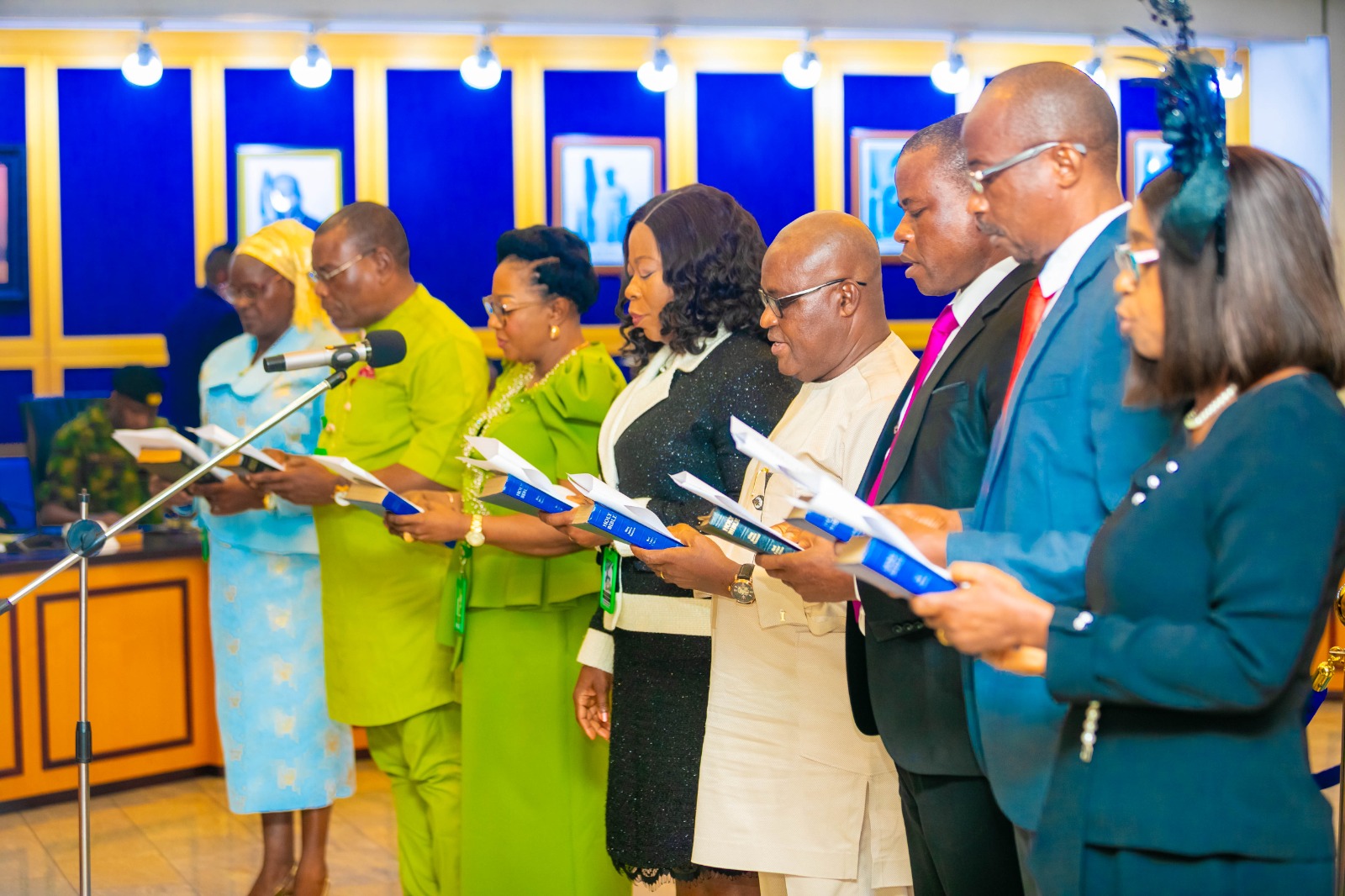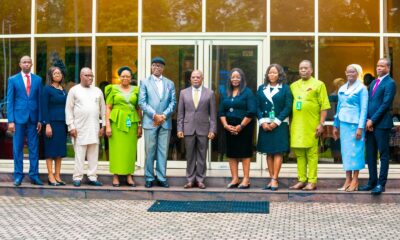News
Alcohol Kills 2.6 Million Drinkers Annually -WHO
The World Health Organisation (WHO) has revealed that nearly three million people die of alcohol annually.
The global health institution added that while the death rate had dropped slightly in recent years it remained “unacceptably high”.
The United Nations health agency’s latest report on alcohol and health said alcohol causes nearly one in 20 deaths globally each year, through drunk driving, alcohol-induced violence and abuse, and a multitude of diseases and disorders.
The report said 2.6 million deaths were attributed to alcohol consumption in 2019 — the latest available statistics — accounting for 4.7 per cent of all deaths worldwide that year.
Nearly three-quarters of those deaths were men, it said.
WHO Director-General, Tedros Adhanom Ghebreyesus, said, “Substance use severely harms individual health, increasing the risk of chronic diseases, mental health conditions, and tragically resulting in millions of preventable deaths every year.”
He pointed out that there had been “some reduction in alcohol consumption and related harm worldwide since 2010.
“(But) the health and social burden due to alcohol use remains unacceptably high.”
He added that younger people were disproportionately affected.
The highest proportion of alcohol-attributable deaths in 2019 — 13 per cent — were among people aged 20 to 39, the WHO said.
Drinking is linked to a slew of health conditions, including cirrhosis of the liver and some cancers.
Of all the fatalities it caused in 2019, the report found that an estimated 1.6 million were from non-communicable diseases.
Of these, 474,000 were from cardiovascular diseases, 401,000 from cancer and a huge 724,000 from injuries, including traffic accidents and self-harm.
Alcohol abuse also makes people more susceptible to infectious diseases such as tuberculosis, HIV and pneumonia, the report found.
An estimated 209 million people lived with alcohol dependence in 2019 — 3.7 per cent of the global population.
Total per capita consumption worldwide decreased slightly to 5.5 litres of alcohol in 2019 from 5.7 litres nine years earlier, the report found.
However, alcohol consumption overall is unevenly distributed around the globe. Well over half of the world’s population over the age of 15 abstains completely.
Europe accounted by far for the highest levels of per capita drinking, at 9.2 litres, followed by the Americas at 7.5 litres.
The lowest consumption was in predominantly Muslim countries in Northern Africa, the Middle East and Asia, the report said.
Among people who drank alcohol in 2019, the report determined they consumed 27 grammes of pure alcohol per day on average.
That is roughly equivalent to two glasses of wine, two small bottles of beer or two shots of spirits.
“This level and frequency of drinking is associated with increased risks of numerous health conditions and associated mortality and disability,” the WHO warned.
In 2019, a full 38 per cent of current drinkers acknowledged having engaged in heavy episodic drinking, defined as consuming at least 60 grammes of pure alcohol on one or more occasions in the preceding month.
Globally, 23.5 per cent of 15- to 19-year-olds were considered current drinkers. That jumped to more than 45 per cent for people in this age group living in Europe, and to nearly 44 per cent in the Americas.
WHO said it was essential to improve access to quality treatment for substance use disorders.
In 2019, the proportion of people contacting such treatment services ranged from below one per cent to 35 per cent in countries providing this data.
“Stigma, discrimination and misconceptions about the efficacy of treatment contribute to these critical gaps in treatment provision”, head of WHO’s unit for alcohol, drugs and addictive behaviours, Vladimir Poznyak, said.
News
Ibas Inaugurates RSIEC, Service Commissions, Healthcare Board In Rivers …Charges Appointees To Embrace Principles Of Service

The Administrator of Rivers State, Vice Admiral (Rtd) Ibok-Ete Ibas, has charged newly appointed Board members to uphold the highest standards of discipline, competence, integrity, and unwavering dedication in their service to the State.
He emphasized that such commitment is critical to stabilizing governance, restoring democratic institutions, and advancing the principles of good governance in the State.
This was contained in a statement by the Administrator’s Senior Special Adviser on Media, Hector Igbikiowubo on Monday.
Ibas issued the charge on Monday while inaugurating the reconstituted Rivers State Independent Electoral Commission (RSIEC), Rivers State Civil Service Commission, Rivers State Local Government Service Commission, and the Rivers State Primary Health Care Management Board at Government House, Port Harcourt.
The Administrator urged the new appointees to embrace their roles with diligence, patriotism, and a commitment to transforming Rivers State through excellent service.
Addressing the Chairman and members of RSIEC, Ibas underscored their pivotal role in ensuring credible local government elections that reflect the will of the people.
“Your task is clear but demanding: to conduct free, fair, transparent, and credible elections at the grassroots level. You must resist bias, favoritism, and external interference while restoring public confidence in the electoral process,” he stated.
“The independence of your actions is crucial to sustaining peace, stability, and grassroots governance. I urge you to act with fairness, impartiality, and professionalism—even in the face of difficult choices,” Ibas added.
The Sole Administrator also charged the Rivers State Civil Service Commission on the need to eliminate mediocrity and foster a culture of excellence through merit-based recruitment, training, and promotions.
“The civil service must transition from favoritism to competence, integrity, and accountability. Your commission will lead reforms, including digital transformation and standardized practices across ministries, departments, and agencies,” he said.
He disclosed that extensive training programmes are underway, with a committee set up to overhaul the public service framework for greater efficiency.
Meanwhile, Ibas urged the Rivers State Local Government Service Commission to ensure professionalism and discipline in local government administration.
“As the closest tier of government to the people, you must drive reforms that insulate the system from politics and mediocrity. Your mandate includes merit-based recruitment, training, and enforcing standards for effective service delivery,” he stated.
In the same vein, the Administrator charged the Rivers State Primary Health Care Management Board with revitalizing healthcare delivery across the state’s 23 local government areas.
“Primary healthcare is the foundation of a sustainable health system. Your board must ensure facilities are adequately staffed, equipped, and operational focusing on maternal health, immunization, malaria control, and community health services,” he said.
He emphasized data-driven operations, incentives for rural health workers, and restoring the referral system to improve healthcare access.
He also assured the Board of sustained government support, including funding, for the effective discharge of their mandates but warned that board members would be held accountable for their performance.
The newly inaugurated members include: RSIEC: Dr. Michael Ekpai Odey (Chairman) with Prof. Arthur Nwafor, Prof. Joyce Akaninwor, and others as members.
Civil Service Commission: Dr. Livinus Bariki (Chairman), Amb. Lot Egopija, Mrs. Maeve Bestman, and others.
Local Govt. Service Commission: Mr. Isreal Amadi (Chairman), Rear Adm. Emmanuel Ofik (Rtd), Dr. Tonye Pepple, and others.
Primary Health Care Board: Dr. Dawari George (Chairman), Dr. Chituru Adiele (Executive Director), Prof. Kaladada Korubo, and representatives from key ministries.
News
Rivers PDP Debunks Sale Of LGA Election Forms

The Publicity Secretary of the Peoples Democratic Party (PDP) in Rivers State, Dr. Kenneth Yowika, has debunked claims that the party has commenced sale of forms for chairmanship and councillorship elections across the 23 local government areas of the state.
Yowika made the rebuttal in a statement made available to newsmen on Wednesday, describing the publication on the social media as baseless and untrue.
He urged members of the PDP to disregard the claim, saying that official communication regarding the sale of forms would be disclosed through the appropriate channels.
“With reference to information trending on social media, it has been falsely claimed that the sale of forms for Chairmanship and Councillorship elections in the 23 Local Government Areas (LGAs) of Rivers State will begin soon.
“However, the party has firmly denied these rumours, stating that they are baseless and untrue.
“The party has its own established methods of reaching out to its numerous supporters.
“The People’s Democratic Party, a law-abiding organisation, will patiently await the release of guidelines from the recently inaugurated Rivers State Independent Electoral Commission (RSIEC) before considering any sale of election forms.
“The PDP is urging its members to remain calm as official communication regarding the sale of forms will be disclosed through appropriate channels,” the statement read.
Enoch Epelle
News
South-South contributes N34trn to Nigeria’s economy in 2024 – Institute
Prof. Pius Olanrewaju, President of the Chartered Institute of Bankers of Nigeria (CIBN), has stated that the South-South region contributes N34 trillion to country’s economy in 2024.
He made the remark at the South-South Zonal Banking and Finance Conference in Calabar, yesterday.
He spoke on the theme, ‘’Building An Inclusive South-South: Economic Diversification as a Catalyst For Development.’’
Olanrewaju, who quoted the data from the Cable Data Index, said the feat was more than 21 per cent of Nigeria’s real Gross Domestic Product (GDP).
The president described the growth as ‘’ impressive,’’ saying that it was not driven by oil alone but significant expansions in trade, services, and the creative industries.
According to him, to fully harness this potential, coordinated financial, technological, and policy support is essential.
“As we work to reposition the South-South for broad-based prosperity, the financial system must play a central role, not merely as a source of capital, but as a catalyst for innovation, ideas incubation, and inclusive economic growth.
“This conference, therefore, provides a strategic opportunity for stakeholders to reimagine the South-South economy, not merely as a resource belt, but as a region of diverse capabilities and resilient enterprises.”
Olanrewaju added that Nigeria must move beyond old models and chart a new course for the development of the South-South region, where financial institutions and stakeholder collaborate to diversify the economy for shared prosperity.
He, however, commended Gov. Bassey Otu for his pledge of land for CIBN Secretariat in Cross River and being the first sitting governor to willingly undergo and complete the Chartered Bankers Programme.
On his part, Gov. Otu said that the conference discussion on the economic diversification in South-South region was timely against the backdrop of global trade and economic volatility that was affecting the nation’s economy.
Represented by his deputy, Mr Peter Odey, Otu said the South-South region must now act with urgency to diversify its economy while leveraging its shared natural endowment in agriculture and extractive resources.
“This conference must help develop tailored financial solutions that reflect the unique strengths and realities of states like Cross River in the south-south.
“Diversification should be evidence-based and must be backed not just by financial advice but project focused financing and real investment support,” he noted.
He said that Cross River had taken the bold step to invest in its agricultural sector by launching an Agro processing hub.
Otu further said that the state had invested in aviation by acquiring more aircrafts for Cally Air, construction of the Bakassi Deep Seaport and injecting N18 billion in its tourism sector.
Similarly, Mr Tolefe Jibunoh, Cross River Branch Controller of the Central Bank of Nigeria (CBN) said that the region was blessed with natural resources, cultural diversities and immense human potentials.
Jibunoh, who was represented by Mr Segun Shittu, Head, Currency Control Office, CBN, Calabar, noted that strategic diversification could unlock unprecedented opportunities for growth in the region.
He added that the CBN remained steadfast to maintain monetary possibilities and promote a sound financial system as a catalyst for sustainable economic development for the benefit of all.
-
News2 days ago
South-South Contributes N34trn To Nigeria’s Economy In 2024 – Institute
-

 Women2 days ago
Women2 days agoWhat To Know About Fufu, Loi Loi
-
Rivers2 days ago
ASALGA Community Debunks Reports On Ownership Of Land Its Settlements
-
Business2 days ago
NCDMB Promises Oil Industry Synergy With Safety Boots Firm
-
City Crime2 days ago
RSG Tasks Federal Government On Maternal Deaths
-
News2 days ago
NOA Set To Unveil National Values Charter — D-G
-

 Featured2 days ago
Featured2 days agoRivers A Strategic Hub for Nigeria’s Blue Economy -Ibas …Calls For Innovation-Driven Solutions
-

 Rivers2 days ago
Rivers2 days agoNDDC Inaugurates Ultra-Modern Market In Rivers Community

